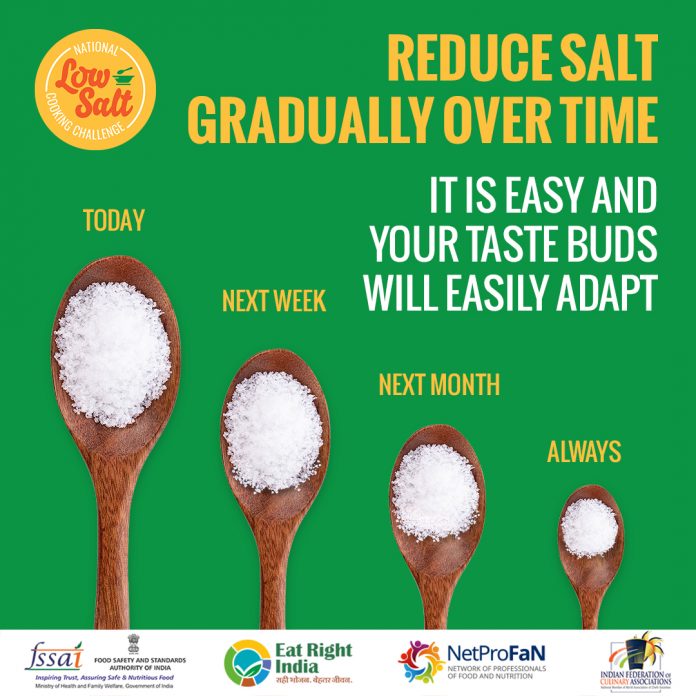Reading Time: 3 minutes
Have you heard of a household with ‘no salt and pepper shakers’ on the table at every meal?
It is a dining table staple, especially salt.
Food without salt is a big NO for most people,
but do you know that too much of it isn’t good for you in the long run?
The ever changing global dietary patterns are influenced by factors like the prevalence of processed foods, urbanisation and evolving lifestyles. This has led to an increased consumption of energy-dense foods rich in unhealthy elements like trans fats, sugars and way too much salt.
Reducing your salt intake is crucial for overall health, especially your heart health, it involves simple adjustments to your palate and food choices.
For individuals accustomed to a lifetime of salt-heavy meals, making a sudden change can be challenging but the effort does bring health with it.
Striking the right salt balance between food with salt to taste versus food with too much salt is crucial, too much is detrimental to health and too little can have health implications. So the phrase ‘salt to taste’ is what strikes the balance.
Let’s weigh the balance —
Why is too much salt bad for you?
Excessive salt consumption poses health risks, primarily due to its sodium content. Notably, salt is the primary source of sodium and elevated sodium consumption is linked to hypertension, kidney disease, fluid retention and an increased risk of heart disease and stroke.
What constitutes an excessive amount of salt?
While some salt is necessary in your diet, the recommended daily intake stands at 6gms but most people surpass this number by heaps (of salt).
How does salt hurt my heart?
Simply put- too much salt can be bad for the heart.
- Eating too much salt can lead to high blood pressure, which is the leading risk factor for heart disease and stroke.
How? The sodium in salt attracts water, meaning that a diet rich in salt will lead to increased water retention in the bloodstream. Consequently, this can result in elevated blood pressure, lung congestion and reduced oxygen levels in the blood.
Elevated blood pressure stands as one of the primary risk factors for the development of heart disease.
- Excessive salt puts pressure on your blood vessels, which, over time, can lead to their stiffening and reduced blood flow. This can potentially lead to heart attacks or strokes.
- Now, let’s delve into atrial fibrillation “Afib” is a specific type of arrhythmia characterised by irregular and frequently accelerated heartbeats. It impairs your heart’s ability to effectively pump blood, thereby heightening the risk of blood clot formation within the heart. This type of clot can potentially migrate to your brain and trigger a stroke. ‘Afib’ increases blood pressure and races the pulse, putting pressure on the heart. All causes of excess salt intake.
If you are at risk for heart disease or suffer from heart related issues, you must exercise caution in regard to your salt intake.
Conclusion —
To cut down your salt intake try integrating the following practices into your daily dietary choices.
- The most effective strategy for reducing salt in your diet involves centering your meals around fresh, unprocessed foods, full of vegetables and fruits. These natural choices are inherently low in salt and promote better heart health.
- Opt for herbs and spices in place of salt for seasoning. (freshly squeezed lemon works great)
- Takeout and restaurant food often contains high levels of salt. Choose to eat home cooked meals whenever you can. This allows you to control the salt quantity in your food and choose reduced-sodium ingredients.
- Another effective approach is substituting salt with a salt alternative like soy sauce or fish sauce which essentially reduces your overall sodium intake while maintaining the saltiness of your meals.
- Many packaged and processed foods contain concealed salt, so it’s vital to scrutinise labels and check for the salt content.
- Switch from refined salt to coarse salt (akka namak) or pink salt.
- Lastly, augment your diet with more potassium by substituting high-sodium items with potassium-rich foods. Consuming potassium-rich foods can assist in lowering blood pressure. Some excellent sources of potassium are potatoes, cantaloupe, bananas, beans, milk and yogurt.
Transitioning away from a lifelong habit of high salt intake may be challenging, but the substantial health benefits make it a worthwhile effort. Moderation is key!
Balance is key!
Choice of products is key!








